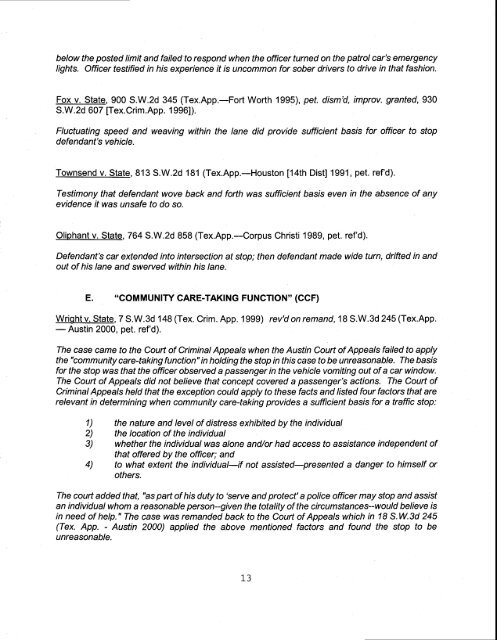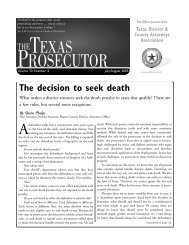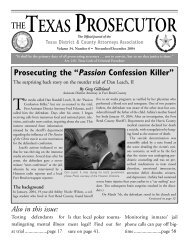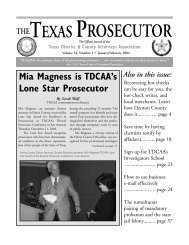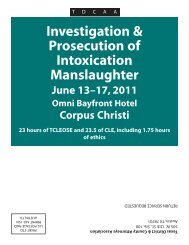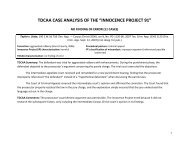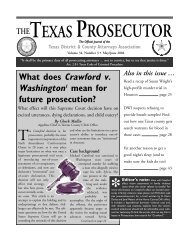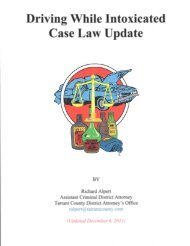Driving While Intoxicated Case Law Update - Texas District ...
Driving While Intoxicated Case Law Update - Texas District ...
Driving While Intoxicated Case Law Update - Texas District ...
- No tags were found...
Create successful ePaper yourself
Turn your PDF publications into a flip-book with our unique Google optimized e-Paper software.
elow the posted limit and failed to respond when the officer turned on the patrol car's emergencylights. Officer testified in his experience it is uncommon for sober drivers to drive in that fashion.Fox v. State, 900 S.W.2d 345 (Tex.App.-Fort Worth 1995), pet. dism'd,S.W.2d 607 [Tex.Crim.App. 1996]).granted,930Fluctuating speed and weaving within the lane did provide sufficient basis for officer to stopdefendant's vehicle.Townsend v. State, 813 S.W.2d 181 (Tex.App.-Houston [14th Dist] 1991, pet. ref'd).Testimony that defendant wove back and forth was sufficient basis even in the absence of anyevidence it was unsafe fo do so.Oliphant v. State,764 S.W.2d 858 (Tex.App.-Corpus Christi 1989, pet. ref'd).Defendant's car extended into intersection at stop;then defendant made wide turn, drifted in andout of his lane and swerved within his lane.E. "COMMUNTTY CARE-TAK|NG FUNCT|ON" (CCF)Wriohtv. State, 7 S.W.3d 148 (Tex. Crim. App. 1999) rev'd on remand,18 S.W.3d 245 (Tex.App.- Austin 2000, pet. ref'd).The case came to the Court of Criminal Appeals when the Austin Court of Appeals faited to applythe "community care-taking function" in holding the stop in this case fo be unreasonable. Ihe basisfor the sfop was that the officer obserued a passenge r in the vehicle vomiting out of a car window.The Court of Appeals did not believe that concept covered a passenger's actions. The Court ofCriminal Appeals held that the exception could apply fo fhese facts and listed four factors that arerelevant in determining when community care-taking provides a sufficient basis for a traffic stop:1)2)3)4)the nature and levelof disfress exhibited by the individualthe location of the individualwhether the individualwas alone and/or had access fo assisfance independent ofthat offered by the officer; andto what extent the individual-if nof assisfed-presented a danger to himself orothers.The court added that, "as part of his duty to 'serve and protect' a police officer may stop and assisfan individual whom a reasonable person--given the totality of the circumstances--would believe isin need of help." The case was remanded back to the Court of Appeals which in 18 S.W.3d 245(Tex. App. - Austin 2000) applied the above mentioned factors and found the stop to beunreasonable.l_J


